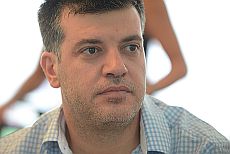
Sayed Kashua
- Israel
- Zu Gast beim ilb: 2009, 2012
Sayed Kashua was born in Tira, Israel, in 1975. He studied Sociology and Philosophy at the Hebrew University of Jerusalem. Kashua is a columnist and film critic, and writes for the Israeli papers »Haaretz« and »Ha’ir« as well as writing screenplays for the sitcom »Avoda Aravit« (tr.: Arab work).
The working language of Kashua, an Israeli citizen with Arab-Palestinian roots, is Hebrew. His texts focus on the social and cultural problems of the Arab and Palestinian population in the country. His debut novel »Arāvîm rôqedîm« (Eng. »Dancing Arabs«, 2002) deals with the failed efforts of a young Israeli Palestinian, who wants to be accepted by Jewish society. Being the only Arab boy in a boarding school class full of Jewish children, the protagonist of the story tries to adjust to their ways of life, but without success. He does not find a home, either in the Arab or in the Jewish world. In a »sober sarcastic tone and with comical anger«, a critic says, Kashua describes the desperation of his hero. In his ironic, sometimes absurd narrative style, Kashua draws a particularly realistic picture of the everyday conflicts the boy has to deal with, in order to be integrated. The writer, thus, becomes the voice of a whole generation of young Arab Israelis who demand social recognition and equality from the Jewish majority. In his second novel »Way-yehî bôqer« (2005; Eng. »Let it be Morning«, 2006) an Arab-Israeli journalist returns to his home, an Arab village near Jerusalem. Right in the middle of the country, a parallel world has come into being there. The village dwellers feel like outcasts; they live in isolation, yet belong to the land that surrounds them. Eventually, the village becomes the venue of peace negotiations. Encircled by the Israeli military forces, the inhabitants are put in confinement, and the village is attributed to the Arab territories. Kashua reveals in a very clear way the precarious situation of Arab Israelis. The society they want to belong to has forgotten them. And what is more, their interests do not matter when it comes to current political conflicts. Sayed Kashua’s recent book »Guf sheni yaḥid« (Eng. »Second Person «, 2010) once again discusses the identity problems of Arab Israelis. A well-off lawyer and Amir, a social worker, wants to be part of Jewish society. The lawyer tries to achieve his goal by means of status symbols and a fancy lifestyle. Amir, however, is driven by minority complexes and adopts the identity of a young Jew who is severely disabled after a suicide attempt, and whom he takes care of. Both figures suffer from torn identities, and symbolize the difficulties and contradictions within the Arab minority society in Israel today.
Sayed Kashua lives in the Palestinian sector of Beit Safafa, in a village near Jerusalem.
© internationales literaturfestival berlin
Tanzende Araber
Berlin Verlag
Berlin, 2002
[Ü: Mirjam Pressler]
Da ward es Morgen
Berlin Verlag
Berlin, 2005
[Ü: Mirjam Pressler]
Zweite Person Singular
Berlin Verlag
Berlin, 2011
[Ü: Mirjam Pressler]
